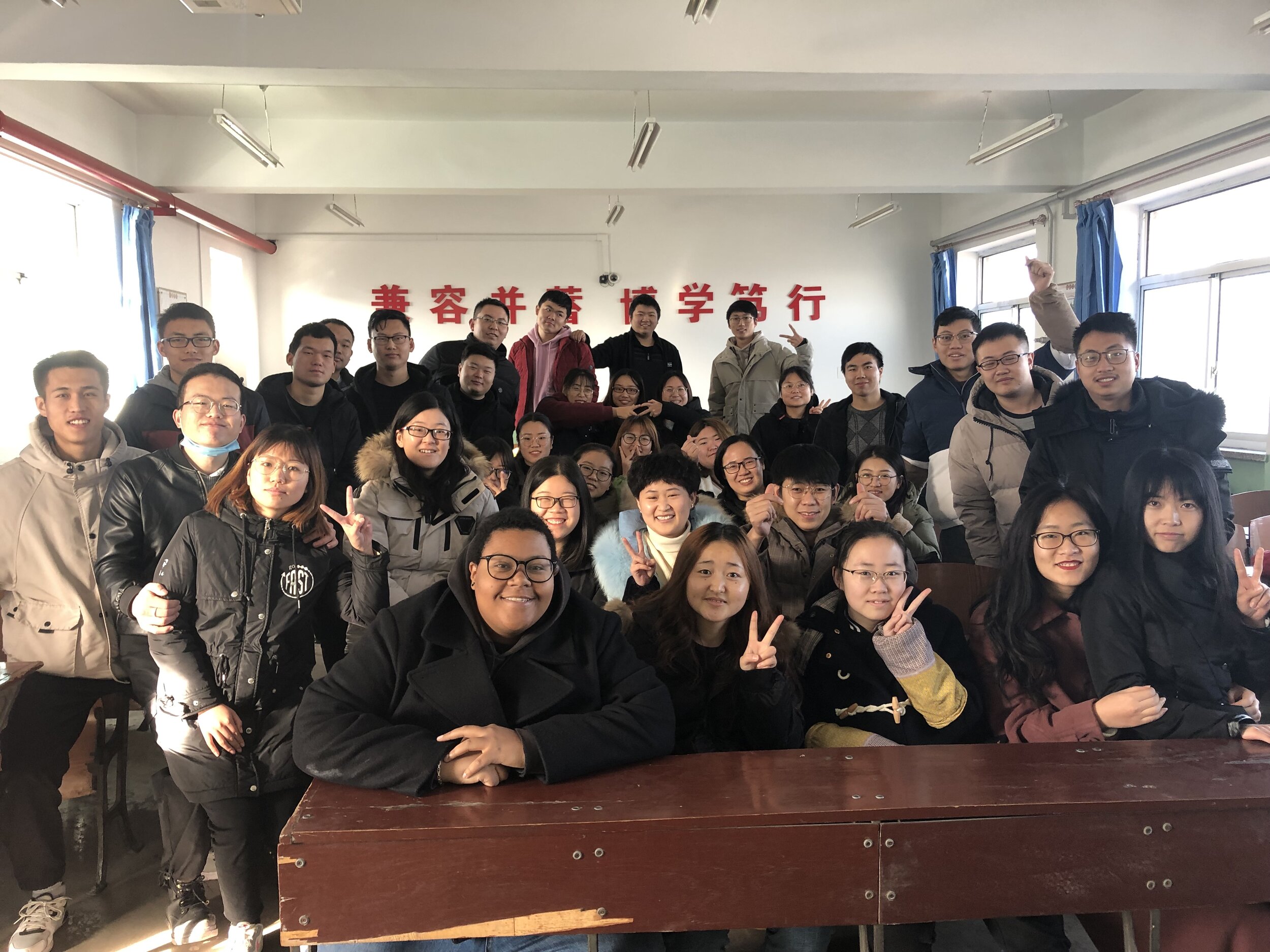
Taigu, China
Shanxi Agricultural University
Amelea Kim ‘12-’14 buying chestnuts.
Shansi and SXAU staff in front of the main gate.
The Fellow and foreign teachers home.
Taigu snack food.
“This desire to ‘capture’ moments comes over me most strongly when I am in the midst of all my friends here in Taigu. Whether it is us eating dinner, taking a walk, playing games, or just sitting and talking, the people here are what have made my experience so meaningful.”
The Oberlin Shansi Fellowship at Shanxi Agricultural University offers a chance to live and work outside major urban centers like Beijing and Shanghai and experience first-hand the rapid economic and social changes affecting the bulk of China’s population. Fellows learn about history, politics, and culture. For those who are willing to work hard, are eager to explore, and are open to new challenges, this Fellowship can be a wonderful mixture of teaching, learning, and cultural discovery.
Location
Shanxi Agricultural University (SXAU) is located in Taigu County, about four hours from Beijing by high-speed rail in the center of Shanxi Province. Compared to Beijing or Shanghai, Taigu County would be considered “rural”; but with a population of about 300,000, many living in newly constructed high rises, it is a part of the rapidly changing “new China” where industrialization and urbanization can be seen up-close, with highways and apartment complexes being constructed around farmland on a daily basis. At the same time, the area is becoming a hub of an expanding interest in wine production, and is also only thirty minutes away from the 14th century walled city of Pingyao, a UNESCO World Heritage site.
About Shanxi Agricultural University
In 1918, two Oberlin graduates traveled to Taigu to teach English at Ming Hsien, a small coeducational high school founded in 1907 by Oberlin graduate H.H. Kung. Ming Hsien evolved into SXAU, a large research institution that serves over 20,000 graduate and undergraduate students today. Eighty percent of SXAU students come from rural backgrounds, and many are the first in their families to attend university. Undergraduates generally take over 20 hours of classes per week. All students study both spoken and written English, and must pass various English exams in order to graduate. Undergraduates major in a variety of subjects, such as Computer Science, English as a Second Language, Physics, and Visual Art and Design. Graduate students focus on agricultural disciplines, such as Animal Husbandry, Land Resource Management, or Veterinary Science.
The Fellowship
The Shansi Fellows at SXAU are given the freedom to design and implement their own conversational English curriculum, generally teaching undergraduates and graduate students 12-14 hours each week. They are often the first foreigners that their students have encountered, so class becomes a time for teachers and students alike to explore cultural differences and misunderstandings. Although their primary responsibility is helping students improve speaking and listening skills, Fellows may teach classes to help students prepare for national or international English exams, and some work closely with faculty and graduate students to edit scientific articles. In addition, Fellows support many extracurricular activities, such as giving monthly English lectures, judging English competitions, or organizing holiday parties.
Past Fellows have pursued various interests in their free time, including attending university classes, participating in intramural sports, learning Tai Chi, conducting interviews to research local development, and studying Chinese watercolor painting and calligraphy. There are ample opportunities to take on additional tutoring positions in a classroom setting or with individuals. While previous Mandarin study is not required, few people speak English in Taigu. It is expected that Fellows will use their time in China to develop Chinese language skills, beginning with summer language study sponsored by Oberlin Shansi before Fellows start at SXAU.
What does a strong candidate for the Fellowship to Shanxi Agricultural University look like?
Shansi looks for Fellowship applicants who are creative and flexible thinkers, who are excited to teach and share, and have a strong sense of responsibility and personal accountability. A strong candidate will have a passion for intercultural exchange and learning about China. Living in Taigu offers an experience that is quite different from living in big Chinese cities with large expat communities, and is wholly different from a study abroad experience in China. Taigu tends to be more conservative than larger cities in terms of local customs, transportation, mindsets, and openness to foreigners. Fellows must be outgoing, diligent, flexible, and patient in order to communicate with people they meet in the school and the larger community.
At the completion of the Fellowship, past Fellows have continued to follow interests in many fields, including education, social work, and international development. Fellows have pursued advanced degrees at institutions including Yale, Emory, and UC Berkeley, received Fulbright and Kiva fellowships, and worked as software developers, architects, and graphic designers.
Language training
Fellows receive language training during the summer before they start their work at SXAU. Shansi provides support for tuition, books, travel and living expenses during the period of the language training. Once the Fellowship begins, Shansi provides an allowance for language study for the remainder of the Fellowship.
Housing
The Fellows share a small house within the walled campus compound. Fellows have their own room, bathroom and kitchen. These apartments are centrally located and it is therefore convenient for friends, students, and staff to visit.
Calendar
Fellows at SXAU arrive on site in late August after summer language preparation. There is usually a break for Spring Festival (Chinese New Year) and during the summer months





